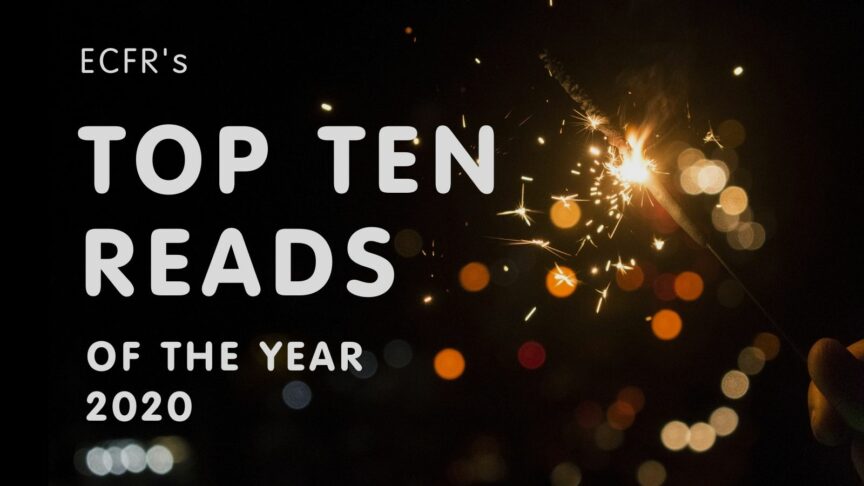Top 10 reads of 2020
As the year draws to a close, ECFR presents a run-down of the 10 most popular publications of 2020
From the worst pandemic in over a century to one of the most intense presidential elections of our time, and everything in between, 2020 has been a year of great uncertainty and political anxiety, to say the very least. As ever, our researchers have worked diligently to keep you informed on global issues and address the greatest strategic challenges facing Europeans during this time.
As the year draws to a close, ECFR presents a run-down of the 10 most popular publications of 2020.
Please like us, follow us, and use the coming break to give our World in 30 Minutes podcast a listen. Explore the rest of the writing our international experts brought you this year.
Happy New Year, and see you in 2021!
- Sweden goes it alone: The EU’s coronavirus exception by Marlene Riedel
Covid-19 serves as a magnifying glass for even the smallest differences between countries – in governance, society, and attitudes. - Military lessons from Nagorno-Karabakh: Reason for Europe to worry by Gustav Gressel
The 2020 Nagorno-Karabakh war holds important lessons for European defence. European governments should study it urgently. - Bad company: How dark money threatens Sudan’s transition by Jean-Baptiste Gallopin
The transition will only succeed if the government stabilises the economy and civilians work hard to tilt the balance of power away from the military. - Serbia’s coronavirus diplomacy unmasked by Majda Ruge with Janka Oertel
The Serbian president has exploited the EU’s internal divisions to insult the bloc and legitimise his policies, as well as his courtship of authoritarian partners. - Deep sea rivals: Europe, Turkey, and new eastern Mediterranean conflict lines by Asli Aydıntaşbaş, Julien Barnes-Dacey, Cinzia Bianco, John V. Bowlus, Hugh Lovatt, Tarek Megerisi, and Michaël Tanchum
The eastern Mediterranean is becoming ever more perilous as geopolitical fault lines steadily enmesh the region. These rifts emerge from the Cyprus ‘frozen conflict’, competition for valuable gas fields, and the increasingly entangled wars in Libya and Syria. - Seven early lessons from the coronavirus by Ivan Krastev
The Covid-19 crisis will dramatically reshape the EU’s response to all other crises it has faced in the last decade. - Infected: The impact of the coronavirus on the Middle East and north Africa by Julien Barnes-Dacey, Cinzia Bianco, Anthony Dworkin, Ellie Geranmayeh, Hugh Lovatt, Tarek Megerisi, and René Wildangel
The coronavirus has hit the Middle East and north Africa at a time when the region is already burdened with multiple problems, including a series of long-running conflicts, sectarian tension, economic crises, and widespread political unrest. In this survey, experts at the European Council on Foreign Relations analyse the Covid-19 pandemic’s current impact on, and likely implications for, the region. - How a Biden win could transform US policy in the Middle East and North Africa by Asli Aydıntaşbaş, Julien Barnes-Dacey, Cinzia Bianco, Anthony Dworkin, Ellie Geranmayeh, Hugh Lovatt, and Tarek Megerisi
Victory for Joe Biden is likely to bring three big policy shifts in the region, opening new possibilities and challenges for Europeans. - It’s Turkey’s Libya now by Tarek Megerisi
European countries should try to revive the political approach to resolving the Libya conflict, particularly given that Turkey may want to do so from its current position of strength. - Europe’s pandemic politics: How the virus has changed the public’s worldview by Ivan Krastev and Mark Leonard
European countries should try to revive the political approach to resolving the Libya conflict, particularly given that Turkey may want to do so from its current position of strength.
The European Council on Foreign Relations does not take collective positions. ECFR publications only represent the views of their individual authors.



